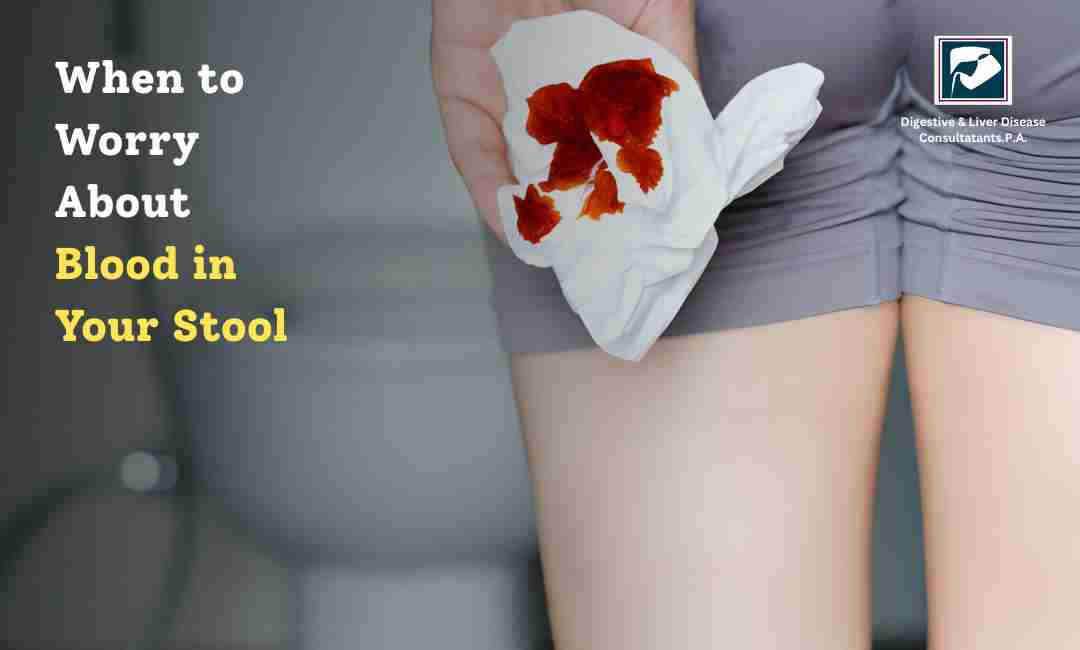Noticing blood in your stool can be alarming. While it’s not always a sign of something serious, it’s a symptom that should never be ignored. Blood in your stool could come from a minor issue like hemorrhoids, or it could signal a more serious digestive condition that needs medical attention.
Understanding what causes rectal bleeding and when to see a doctor can help you take the right steps for your digestive health.
What Does Blood in the Stool Mean?
Blood in the stool, also known as rectal bleeding, means that bleeding is occurring somewhere in your digestive tract—from the esophagus to the rectum. The color of the blood can often provide clues about where it’s coming from:
Bright red blood: Usually indicates bleeding in the lower digestive tract, such as the rectum or anus.
Dark maroon or black stool (melena): Suggests bleeding higher up in the digestive tract, such as the stomach or small intestine.
Even a small amount of blood in your stool is worth checking out, especially if it happens more than once.
Common Causes of Blood in Stool
There are several possible reasons for rectal bleeding—some mild and others more serious.
1. Hemorrhoids
Hemorrhoids are swollen veins in the rectum or anus that can bleed during bowel movements. They often cause bright red blood on the toilet paper or surface of the stool. Other symptoms include itching, discomfort, and swelling around the anus.
2. Anal Fissures
A small tear in the lining of the anus, known as an anal fissure, can lead to pain and bleeding, especially during bowel movements. These are often caused by constipation or passing hard stools.
3. Diverticulosis
Diverticulosis occurs when small pouches (diverticula) form in the walls of the colon. If these pouches become inflamed or infected (diverticulitis), they can cause bleeding, pain, or infection.
4. Polyps or Colorectal Cancer
Colon polyps are growths on the inner wall of the colon that can sometimes bleed. While most are benign, some may develop into colorectal cancer over time. Regular colonoscopies are important for early detection and prevention.
5. Inflammatory Bowel Disease (IBD)
Conditions like ulcerative colitis and Crohn’s disease cause chronic inflammation in the digestive tract, leading to diarrhea, abdominal pain, and sometimes blood in the stool.
6. Peptic Ulcers
Open sores in the lining of the stomach or small intestine can cause internal bleeding. This may result in black, tarry stools due to partially digested blood.
7. Gastrointestinal Infections
Certain bacterial or viral infections can inflame the intestinal lining and cause bleeding, often accompanied by diarrhea, cramps, and fever.
When Should You Worry?
While minor causes like hemorrhoids or fissures are common, persistent or unexplained bleeding needs medical evaluation. You should see a doctor immediately if you notice:
- Blood in your stool lasting more than a few days
- Dark, tarry, or maroon-colored stools
- Large amounts of blood or clots
- Dizziness, weakness, or fatigue
- Unintentional weight loss
- Changes in bowel habits (constipation, diarrhea, or thinner stools)
- Severe abdominal pain
These symptoms could indicate a more serious condition, such as colon cancer, IBD, or ulcers.
How Doctors Diagnose the Cause of Bleeding?
When you visit a gastroenterologist, they will first review your medical history and symptoms. Depending on your case, they may recommend diagnostic tests such as:
Colonoscopy: A thin, flexible tube with a camera is inserted into the colon to view the lining and detect bleeding, polyps, or inflammation.
Upper Endoscopy (EGD): Examines the esophagus, stomach, and upper small intestine for ulcers or other sources of bleeding.
Stool Tests: Detect hidden (occult) blood or infections.
CT Scan or Imaging: Identifies abnormalities in the digestive tract.
Blood Tests: Check for anemia or infection caused by internal bleeding.
Early diagnosis helps ensure effective treatment and prevents complications.
Treatment Options
Treatment depends on the cause and severity of bleeding:
Hemorrhoids or fissures: Usually managed with topical creams, stool softeners, and increased fiber intake.
Diverticulitis or infections: Treated with antibiotics and dietary adjustments.
Inflammatory bowel disease: Requires anti-inflammatory medications or immune-suppressing therapy.
Polyps or cancer: Removed through colonoscopy or treated surgically, depending on the diagnosis.
Peptic ulcers: Managed with acid-reducing medications and lifestyle changes.
Your gastroenterologist will create a personalized treatment plan to address both the underlying cause and your overall digestive health.
How to Prevent Rectal Bleeding
While not all causes can be prevented, you can reduce your risk with healthy habits:
- Eat a high-fiber diet: Fiber keeps stools soft and reduces strain during bowel movements.
- Stay hydrated: Drink plenty of water to prevent constipation.
- Avoid straining: Don’t push too hard when using the restroom.
- Exercise regularly: Helps maintain good digestion and bowel regularity.
- Avoid excessive alcohol and smoking: Both can irritate the digestive system.
- Get regular screenings: Colonoscopy is recommended starting at age 45—or earlier if you have risk factors.
Being proactive about your digestive health can help detect problems early and prevent serious complications.
About Digestive & Liver Disease Consultants, P.A.
At Digestive & Liver Disease Consultants, P.A., our team of board-certified gastroenterologists is dedicated to providing comprehensive care for all digestive and liver conditions. We specialize in the diagnosis and treatment of acid reflux, IBS, IBD, liver disease, swallowing disorders, and colorectal conditions.
With state-of-the-art technology and personalized care, we help patients across the Greater Houston area achieve lasting digestive wellness. Our goal is to ensure early detection, effective treatment, and better quality of life for every patient.
Conclusion
Finding blood in your stool can be unsettling, but understanding the possible causes and getting timely medical advice can make a huge difference. While minor issues like hemorrhoids are common, ongoing or unexplained bleeding could signal something more serious.
Don’t ignore the warning signs—your digestive system may be trying to tell you something important.
If you’ve noticed blood in your stool or other changes in your digestive health, contact Digestive & Liver Disease Consultants, P.A. Our experienced gastroenterologists can help diagnose the cause and provide effective, compassionate treatment.






